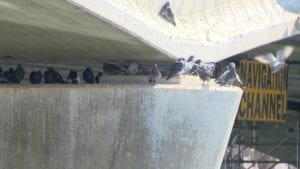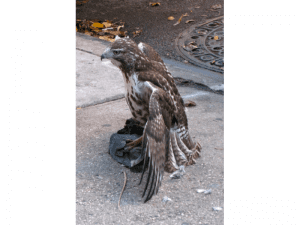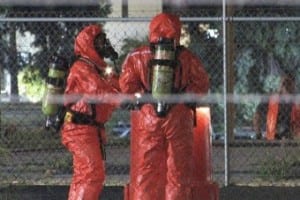
by Pigeon Patrol | Aug 8, 2019 | 4-S Gel Bird repellent, Animal Deterrent Products, Bird Deterrent Products, Bird Netting, Pigeon Patrol's Services, Pigeon Spikes, Pigeons in the News, UltraSonic Bird Control

Crews tasked with cleaning a Saskatchewan bridge are in for a dirty job.
The City of Saskatoon said that over the last 50 years one of its bridges has accumulated nearly 350 tonnes of pigeon poop – which is roughly equal to 230 cars parked on the bridge.
It said the feces adds unnecessary weight and the pigeon droppings contain uric acid which can damage concrete, affecting the integrity of the bridge.
This also means the extermination of about 1,500 members of the feathered flock that makes the Sid Buckwold Bridge home.
The city said relocating or displacing the birds is not recommended because they are likely to fly back or move into other private properties or civic spaces. Homing pigeons are likely to return to their original roosting areas, making relocation difficult as a long term solution.
A local wildlife advocate is disappointed and questions why alternatives can’t be found that would allow the birds to live. “In Saskatchewan, a very, very, very common response is if it pisses you off, shoot it,” said Jan Shadick, volunteer director of Living Sky Wildlife Rehabilitation.
Regina and Vancouver rely on pigeon spikes, protective netting or cages to keep pigeons off their facilities. Toronto and Calgary do not practice Pigeon control.
Here at Pigeon Patrol, we manufacture, sell, and install humane bird exclusion products, such as bird spikes and netting.
Bird spikes, Bird Gone, Pigeon Gone, Pigeon problems, pigeon spikes, 1-877-4NO-BIRD, 4-S Gel, Bird Control, Pigeon Control, bird repellent, Bird Spikes, sonic bird repellent, stainless steel bird spikes, bird spikes Vancouver, Ultra Sonic Bird Control, Bird Netting, Plastic Bird Spikes, Canada bird spike deterrents, Pigeon Pests, B Gone Pigeon, Pigeon Patrol, pest controller, pest control operator, pest control technician, Pigeon Control Products, humane pigeon spikes, pigeon deterrents, pigeon traps, Pigeon repellents, Sound & Laser Deterrents, wildlife control, raccoon, skunk, squirrel deterrent, De-Fence Spikes, Dragons Den.

by johnnymarin | Feb 14, 2019 | Pigeon Patrol's Services
 Scotland’s health secretary has said she believes infection control is good enough at a hospital where two patients died after contracting an infection linked to pigeon droppings.
Scotland’s health secretary has said she believes infection control is good enough at a hospital where two patients died after contracting an infection linked to pigeon droppings.
Jeane Freeman has ordered a review of the design, build, handover and maintenance of the flagship £842 million Queen Elizabeth University Hospital in Glasgow as investigations continue.
The Cryptococcus bacteria, a fungal infection linked to pigeon droppings and soil, was found to be a contributory factor in the death of a child, while a second patient was also found to have an infection caused by inhaling the fungus Cryptococcus, although the health secretary has said it did not contribute to their death.
Pigeon droppings found in a plant room on the hospital’s roof are believed to be the source of the problem and investigations are continuing to establish how the bacteria entered a closed ventilation system.
The issue comes after problems with bacteria in the water supply at the adjoining Royal Hospital for Children last year which led to child cancer patients being moved.
In an interview on BBC Good Morning Scotland, Ms Freeman was asked: ‘Do you believe infection control is good enough at this hospital?’
She replied: ‘Yes I do. Yes I do and I think the statistics show that. The overall infection rate in the Queen Elizabeth is 4 per cent, the average across Scotland is 4.9 per cent. It is at least on par with all the other hospitals across Scotland and in fact doing a bit better.
‘But infection happens in hospitals. That’s why we have the Scottish Patient Safety Programme that has significantly reduced infection rates across our hospitals and healthcare settings over the last 10 years or so.
‘What you need to be able to do though is have those additional infection control measures to put in place as they have done at the Queen Elizabeth, with the HEPA (high efficiency particulate air) filters, with the anti-fungal protection for particularly vulnerable patients in the area where the Crypotoccocus infection was discovered.’
Ms Freeman said she hopes to announce the remit of the review by the end of the week.
She could not give a timescale for how long the review will take and said that while she wants it to reach its conclusions and recommendations as quickly as possible, it needs to take long enough to ensure it is ‘robust’.
She said: ‘There have been a number of instances where parts of the building, the fabric of the building, have been less than we would want it to be.
‘Some of those don’t directly affect patients but obviously our primary concern is that this building is, in its fabric, in its internal infrastructure, is absolutely fit for purpose, so that is why I’ve ordered the review and made sure that we will have independent expert advice to that review.
‘It will look at everything from the design, the construction, the commissioning and the continuing maintenance to try and identify what more might need to be done to ensure that the building is fit for purpose, but also whether there are any particular lessons for us as we go on to instigate other builds of healthcare facilities across Scotland.
‘The review of the Queen Elizabeth will have significant importance for all the new build that we’re undertaking.’
Scottish Labour health spokeswoman Monica Lennon said: ‘The Health Secretary says infection rates are on a par with other hospitals in Scotland but this is supposed to be a world-leading hospital.
‘The Queen Elizabeth University Hospital was an £842 million investment by the Government – the fact we are now having a review into its infrastructure suggests something has gone very wrong.
‘The review must answer honest questions about what has gone wrong here.’
About Pigeon Patrol:
Pigeon Patrol Products & Services is the leading manufacturer and distributor of bird deterrent (control) products in Canada. Pigeon Patrol products have solved pest bird problems in industrial, commercial, and residential settings since 2000, by using safe and humane bird deterrents with only bird and animal friendly solutions. At Pigeon Patrol, we manufacture and offer a variety of bird deterrents, ranging from Ultra-flex Bird Spikes with UV protection, Bird Netting, 4-S Gel and the best Ultrasonic and audible sound devices on the market today.
Voted Best Canadian wholesaler for Bird Deterrent products four years in a row.
Contact Info: 1- 877– 4– NO-BIRD (www.pigeonpatrol.ca)

by johnnymarin | Feb 13, 2019 | Pigeon Patrol's Services
 What do you do when birds poop all over your property?
What do you do when birds poop all over your property?
If you’re TransLink, you send in a falcon.
In an effort to deal with pigeons nesting at the Commercial-Broadway skytrain station, TransLink is using a bird, to flip off other birds.
A Bird Poop Problem
A new platform for the station, set to open February 2nd, will allow commuters to enter westbound from both sides.
The company was hoping the amount of noise made by the skytrain and commuters would shake off the birds, but hasn’t so far.
With the threat of bird poop being a real concern for TransLink, the company decided to bring in a falcon.
Jill Drews, Senior Issues Management Advisor for TransLink says, “the falcon kind of goes in from time to time and scares them away. Hopefully, they remember this is not a safe place to be.”
But there’s more.
In addition to the falcon, Drews says electric strips, that cause a “very,very minor” shock will also be brought in. “It won’t harm the birds. But it’s just irritating so it will hopefully deter them from nesting,” she says.
Spikes and netting will also by installed in an effort to stop the birds from landing.
The pigeons in question could not be reached for a comment.
About Pigeon Patrol:
Pigeon Patrol Products & Services is the leading manufacturer and distributor of bird deterrent (control) products in Canada. Pigeon Patrol products have solved pest bird problems in industrial, commercial, and residential settings since 2000, by using safe and humane bird deterrents with only bird and animal friendly solutions. At Pigeon Patrol, we manufacture and offer a variety of bird deterrents, ranging from Ultra-flex Bird Spikes with UV protection, Bird Netting, 4-S Gel and the best Ultrasonic and audible sound devices on the market today.
Voted Best Canadian wholesaler for Bird Deterrent products four years in a row.
Contact Info: 1- 877– 4– NO-BIRD (www.pigeonpatrol.ca)

by johnnymarin | Feb 12, 2019 | Pigeons in the News
 NHS Lanarkshire confirmed that additional checks will be carried out at Hairmyres, Monklands and Wishaw General with “remedial actions” taken if necessary.
NHS Lanarkshire confirmed that additional checks will be carried out at Hairmyres, Monklands and Wishaw General with “remedial actions” taken if necessary.
NHS Ayrshire and Arran said all hospital plant rooms were regularly checked for “potential threats.”
John Paterson, NHS Lanarkshire director of property and support services, said: “Planned preventative maintenance programmes are being reviewed and refreshed in light of emerging details from the recent incident at Queen Elizabeth University Hospital.
“We are currently carrying out additional checks for the presence of pigeons and taking any necessary remedial actions if found or reported.”
A spokeswoman for NHS Ayrshire and Arran, which runs hospitals including Crosshouse in Kilmarnock, said: “NHS Ayrshire & Arran Estates Department regularly monitors the safety of the plant rooms at all of our major sites against all potential threats or defects, including access by vermin.
“ Should any infection control issues occur, we work closely with our Infection Control department to deal with them immediately.”
About Pigeon Patrol:
Pigeon Patrol Products & Services is the leading manufacturer and distributor of bird deterrent (control) products in Canada. Pigeon Patrol products have solved pest bird problems in industrial, commercial, and residential settings since 2000, by using safe and humane bird deterrents with only bird and animal friendly solutions. At Pigeon Patrol, we manufacture and offer a variety of bird deterrents, ranging from Ultra-flex Bird Spikes with UV protection, Bird Netting, 4-S Gel and the best Ultrasonic and audible sound devices on the market today.
Voted Best Canadian wholesaler for Bird Deterrent products four years in a row.
Contact Info: 1- 877– 4– NO-BIRD (www.pigeonpatrol.ca)

by johnnymarin | Feb 11, 2019 | Pigeon Patrol's Services
 Pigeon droppings could today still be seen on the ground outside a scandal-hit hospital where two patients died after contracting a fungal infection.
Pigeon droppings could today still be seen on the ground outside a scandal-hit hospital where two patients died after contracting a fungal infection.
A child, said to be a cancer patient, and a pensioner both died at the hospital in Glasgow after becoming ill with cryptococcus, which is linked to pigeon droppings.
The 14-floor Queen Elizabeth University Hospital, one of the largest in Europe, is under scrutiny after claims the pigeon infestation was known about two years ago.
Separately, a third patient at the same hospital was last night seriously ill with the life-threatening disease of mucoraceous, which is another type of fungus.
Pigeon droppings on the grounds of The Queen Elizabeth University Hospital in Glasgow today
The Greater Glasgow and Clyde Health Board said two patients had tested positive for the condition, with one in a stable and the other in a serious condition.
Today, pigeon droppings could be seen on the ground outside the ultra-modern building, which opened in April 2015, costing £842million.
Meanwhile it also emerged that pest control had been called in this week to another hospital in the city, the New Victoria Hospital in Southside.
Healthcare workers reported concerns about pigeon droppings in an underground car park.
One worker, speaking on the condition of anonymity, said: ‘In the underground car park there is significant pigeon droppings which have remained for the last year.
Pigeons roost on top of the neurology building at the £842million hospital in Glasgow today
‘Every person who uses this stairwell steps in the droppings and tramples it through the whole hospital. No effort has been made to remove the pigeons from the car park.’
What is cryptococcus and who is at risk?
Cryptococcus is a yeast-like fungal infection found in soil and bird faeces that can infect humans who breathe it in.
The infection causes symptoms similar to those faced by people with pneumonia, including coughing, fever and headaches.
Cryptococcus, which normally affects people with weak immune systems, can even impact their mental wellbeing.
But most people who become infected to do not get sick – and it cannot be spread between people.
Pigeons can also transmit the fungal infection of histoplasmosis to humans, as well as bacteria such as E.coli and salmonella – and even a form of encephalitis which can cause the brain to inflame.
But most people who are exposed to pigeons have no problems because they do not come in contact with large quantities of infected droppings.
A spokesman for NHS Greater Glasgow and Clyde said: ‘Our pest control contractor has been called to respond to a complaint received (on Tuesday) about pigeon droppings in the car park at the New Victoria hospital.’
The child who died from the infection was reported to be a cancer patient from the Grampian area, while the other person who was infected was an elderly woman, according to the Glasgow Evening Times.
The young patient was among those receiving treatment in the main adult building as a result of contamination in the water supply in the children’s hospital – which led to six paediatric patients developing infections last year, according to a source.
Children being treated in wards 2A, 2B and the adjoining bone marrow transplant unit were transferred to wards in the adult hospital while work is ongoing to upgrade the ventilation and water system.
A hospital source claimed the room the child was transferred to should have included a Hepa air filter.
The health board said portable Hepa filters are now being installed in ‘all the rooms identified as requiring them’ as part of additional infection control measures following the deaths.
The source said: ‘The child that died had been moved from the children’s hospital to a room in the adult hospital. The Hepa filter should already have been fitted.
‘I have been told that there are other rooms in the hospital, where HEPA filters should have been fitted but weren’t.’
Pigeons fly over The Queen Elizabeth University Hospital in Glasgow today after the incidents
NHS Greater Glasgow and Clyde said a ‘small crack’ was identified in the wall of the hospital’s plant room – identified as the source of the infection – and spores from the droppings ‘may have entered the air supply via the ventilation system.
Snags, blunders and deaths at The Queen Elizabeth Hospital
March 2016 Operations cancelled because of sewage leak.
April 2016 Problems found at specialist children’s mental health ward. Its rooftop garden was deemed a health and safety risk; locks not fit for purpose and no staff alarm system to call for back-up.
September 2016 Patients and visitors complain of getting stuck in lifts.
March 2017 ‘Significant concerns’ raised by Healthcare Environment Inspectorate during unannounced visit – including dust and body fluids on patient trolleys and mattresses.
October 2017 Contractors carrying out routine maintenance smash a section of glass on the building’s roof. Emergency helicopters diverted.
November 2017 Automatic entrance doors opening too frequently because of sensor problems. Reception staff given heaters to keep them warm.
December 2017 Cladding similar to Grenfell Tower also found at the QEUH and removed.
March 2018 Bacteria found in the water supply at the Royal Hospital for Children, which is part of the site. Children with cancer, who have low immunity, infected and treated with antibiotics. Taps and ventilation system in the area now being upgraded.
August 2018 Pane of glass fell ten floors and shattered near front entrance, said to be the third time this had happened. Safety netting installed.
October 2018 Blocked waste-pipe damaged ceiling at the entrance of the building.
December 2018 Two patients contract Cryptococcus, linked to pigeons nesting in walls, but this is not made public until weeks later, when Jeane Freeman confirms infection contributed to the death of a child.
January 2019 Health bosses confirm that two other patients have been infected with an unspecified fungal organism caused by a ‘water leak’.
However, the source said they had seen pictures taken by a bacteriologist employed by the health board which showed the plant room – which contains air conditioning and ventilation equipment – in a ‘filthy’ state.
He said the room was ‘infested’ with droppings and pigeon feathers, suggesting several birds had been in the room.
The source said: ‘The room had a serious infestation of pigeon droppings. It was filthy.
‘The Health Board knew about the problem on December 23 but they didn’t take appropriate action. The pigeons were in that room.’
NHS Greater Glasgow and Clyde has been approached for comment.
Today, Nicola Sturgeon was pressed on whether the ‘tragic’ death of a child at Scotland’s flagship hospital was linked to the NHS’s £900million repairs and maintenance backlog.
Ms Sturgeon said the situation was ‘a very serious incident that must be and is being treated seriously’.
The First Minister expressed her ‘deepest condolences to the families of the two patients who contracted the infection and who have subsequently died’.
Scottish Conservative interim leader Jackson Carlaw said the ‘alarming’ situation at the flagship hospital ‘raised wider questions about the Government’s record on the NHS, because there is a £900 million maintenance backlog on NHS buildings, including hospitals in Scotland’.
Pressing the SNP leader at First Minister’s Questions, he said: ‘Is it any wonder then that we do see problems emerging, not just at the Queen Elizabeth but at other hospitals across Scotland?’
The Tory stressed while tens of thousands of Scots had been successfully treated at the hospital the ‘tragic events’ had ‘shaken confidence’.
He also noted public spending watchdogs at Audit Scotland had reported there were currently ‘no coherent proposals to bring our NHS estate up to standard’.
Ms Sturgeon said: ‘At any given time there will be maintenance requirements in the health service estate.
Pigeon droppings could be seen on the ground outside the modern hospital, pictured today
‘The Scottish Government works closely with health boards through our capital allocations to health boards to make sure we’re providing, as far as we can within the resources available to us, capital provision to do that.’
Mucormycosis, a fungal infection suffered by two further patients at the Glasgow hospital
Two patients are currently suffering from mucormycosis at the hospital, which is a rare and severe fungus. infection from the fungi mucorales
The condition has a very high mortality rate of at least 50 per cent, with severe infection of the facial sinuses potentially extending into the brain.
Those at risk are people with impaired immunity from various causes, including serioid use, iron overload, burns or malnutrition.
The condition can be treated through the reversal of underlying disease or surgical management.
She added: ‘I’m not going to go into party political exchanges on this issue, it is too serious for that.
‘But obviously we work within a financial envelope and I think everybody knows that that has been under pressure in recent years and everybody knows the reasons for that.
‘But within that we have prioritised spending on the health service and we will continue to do so.’
Scottish Labour leader Richard Leonard also challenged her on the outbreak, saying: ‘The awful news that two patients, including a child, died after contracting an infection at the Queen Elizabeth University Hospital in Glasgow has shocked us all.
‘Our sympathies, our thoughts, are with the families who have lost loved ones. This simply should not have happened.’
He also listed a number of incidents at the hospital since it opened four years ago, including a premature baby dying from an infection and 22 children becoming infected from bacteria in the water supply. He challenged Ms Sturgeon over whether this was ‘good enough’.
This chair covered in pigeon droppings was left in the open for three months at the hospital
The First Minister responded: ‘The evidence suggests there is no general problem with infection control.’
She added: ‘Nobody thinks it is good enough for any patient to get an infection in hospital.
‘Infections do happen in hospitals. There is probably not a hospital anywhere that hasn’t had some kind of infection outbreak and the implications for very ill patients can be severe.
‘That is why it is so important that everything possible is done to reduce infection and everything possible will be done in this case to ensure there is repetition.’
Across Scotland she said there had been a fall in hospital infections since a major outbreak of Clostridium difficile at the Vale of Leven Hospital in West Dunbartonshire more than a decade ago due to improvements in infection control.
Nightingale Associates, which was bought by Canadian firm IBI Group for £13million in June 2010, was the architect behind the hospital.
About Pigeon Patrol:
Pigeon Patrol Products & Services is the leading manufacturer and distributor of bird deterrent (control) products in Canada. Pigeon Patrol products have solved pest bird problems in industrial, commercial, and residential settings since 2000, by using safe and humane bird deterrents with only bird and animal friendly solutions. At Pigeon Patrol, we manufacture and offer a variety of bird deterrents, ranging from Ultra-flex Bird Spikes with UV protection, Bird Netting, 4-S Gel and the best Ultrasonic and audible sound devices on the market today.
Voted Best Canadian wholesaler for Bird Deterrent products four years in a row.
Contact Info: 1- 877– 4– NO-BIRD (www.pigeonpatrol.ca)






